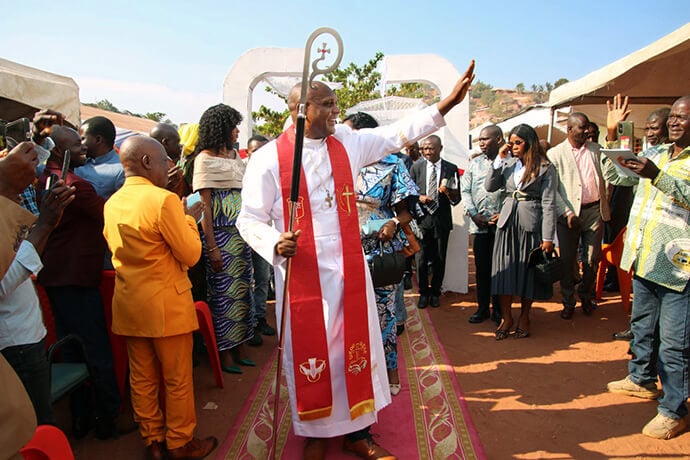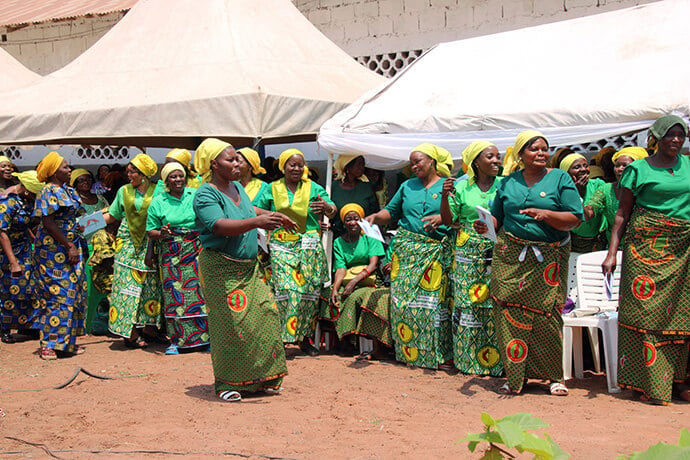Key points:
- Bishop Nelson Kalombo Ngoy presented a five-year plan focused on five strategic pillars: spiritual strengthening, leadership training, evangelism, social development and good governance of the church.
- The new Tanganyika Episcopal Area, with headquarters in Kalemie, Congo, consists of two annual conferences: Tanganyika and Kamalondo.
- Ngoy emphasized that the addition is not simply an administrative change but a divine call to bring the light of the Gospel further afield.
More than 1,000 United Methodist faithful in southeastern Congo gathered Sept. 14 to celebrate the establishment of the new Tanganyika Episcopal Area and the installation of its first bishop, Nelson Kalombo Ngoy.
Kalemie Centre United Methodist Church hosted the event, which brought together political dignitaries, religious leaders and international partners. The new Tanganyika Episcopal Area, with headquarters in Kalemie, Congo, consists of two annual conferences: Tanganyika and Kamalondo.
The ceremony was described as historic by North Katanga Area Bishop Mande Muyombo, moderator of the ceremony and president of the Africa Colleges of Bishops. He called the day significant, noting “the angels are visiting the Tanganyika region.”
Ngoy, the third bishop elected July 12 at the Mid Africa Central Conference, described the creation of his new region as a “prophetic act, a spiritual establishment and a renewed mission.” The conference, formerly the Congo Central Conference, now has five episcopal areas: Central Congo, East Congo, North Katanga, South Congo-Zambia and Tanganyika.
Ngoy emphasized that the addition is not simply an administrative change but a divine call to bring the light of the Gospel further afield and to strengthen the pastoral presence within communities.
The installation ceremony was rich in rituals and symbols. Muyombo presented Ngoy with the official signs of episcopal ministry, including the episcopal staff, gavel, Book of Discipline, Bible and the flag of the new episcopal region.
“This staff makes you a shepherd to watch over the sheep of Jesus Christ. This is episcopal power. It is God who makes you,” Muyombo said. “This gesture symbolizes the transmission of divine authority and a great pastoral responsibility to lead God’s flock.”
Ngoy also received a series of symbolic gifts from clergy and laity of the Tanganyika Episcopal Area. Each item, presented with prayer and hope, highlighted a facet of the ministry expected of their new leader. Water was offered as a sign of holiness, while bread and the cup were symbols of unity in the Holy Spirit.

Representatives of United Methodist Men presented the bishop with a trowel and a mason’s level, signifying the continued building of the church, both spiritually and physically.
United Women in Faith presented a basin and towel, recalling Jesus’ humble act of washing his disciples’ feet and symbolizing the selfless service that the bishop must offer to all.
Local evangelists offered a net, the image of the fisher of new souls. Lay Leader Senga Londwa Rubain presented a globe, declaring that Ngoy is not only the leader of the Tanganyika region but also a bishop of The United Methodist Church worldwide, charged with serving “everyone without distinction of tribe.”
In his inaugural address, Ngoy presented an ambitious pastoral vision. He defined his approach by identifying himself not as a “great monarch or dictator” but as a “doulos” — a Greek term meaning “devoted servant.”
Ngoy promised to serve with humility and to see the face of Christ in every person. “I will lead the sheep according to what Jesus Christ decides,” he said.
The bishop shared his five-year plan, structured around five strategic pillars:
- Spiritual and pastoral strengthening, focused on a church rooted in prayer and the Word for spiritual revival.
- Leadership training and mentoring, with an emphasis on developing leaders within the community.
- Evangelism and mission, advocating the proclamation of the Gospel and the formation of mature disciples.
- Social and community development, including direct support to communities through social, pastoral and educational activities.
- Good church governance, ensuring sound and responsible administration.
The bishop invoked the principles of Matthew 25 to “feed the hungry” and “comfort the weak,” James 1:27 to “care for orphans and widows,” and Micah 6:8 to “act justly, love mercy and walk humbly with your God.”
He also promised zero tolerance for tribalism, which he called “a terrible scourge that destroys the prophetic mission of the body of Christ.”
“Beloved, this five-year plan is not just a roadmap. It is a vision given by God for Tanganyika to become a land of light, renewal and blessing. We commit ourselves to walk together in prayer, perseverance and unity, so that the glory of God may be powerfully manifested in this region,” Ngoy said.

The province of Tanganyika in Congo has been challenged by insecurity, particularly between 2013 and 2020 following violent clashes between the Batwa Pygmy and Luba Bantu communities. These tensions, initially linked to the Batwa’s demand for fundamental rights, escalated into armed conflict, causing more than a thousand deaths and nearly 650,000 displaced persons, as well as the destruction of thousands of homes in Nyunzu, Kabalo, Manono and Kongolo.
The recurring violence has led to the collapse of the local economy, rising malnutrition and difficulty accessing basic social services. Despite the signing of peace agreements in 2015 and mediation attempts by authorities and international agencies, mistrust persists between the communities.
“In this context, the pastoral and social mission carried out by the new episcopal region of Tanganyika and its bishop takes on a crucial dimension for peacebuilding, reconciliation and sustainable development within a deeply fragile society,” Rubain said.
He emphasized the bishop’s personal involvement in the peace process, adding that Ngoy is seen as a development agent who can provide solutions to the root causes of conflict.
Subscribe to our
e-newsletter
The Rev. Kibondo Ngisi Joseph, dean of district superintendents, described the new episcopal region as a major undertaking. The presence of a bishop on the ground, he said, is “a window of opportunity” that will allow for more direct communication and collaboration, but also for the implementation of development projects.
Kibondo Ngisi emphasized the role of the church in peacebuilding. “We must live in collaboration with minority groups for peaceful coexistence ... The church has a big role to play; it is the church that can also facilitate love, cohesion and exchange.”
While the installation was marked with enthusiasm, church leaders also acknowledged the challenges facing the new bishop, including the region’s lack of transportation and communication.
“The challenge here is that we are a rural region. We are isolated; there are no roads. It’s a big problem,” Kibondo Ngisi said.
The precarious situation of pastors is another major issue, he added, with some of them “going a whole day without eating” in remote villages.
Rubain highlighted the urgent need to build new structures, whether churches or medical facilities, so that women no longer need to travel long distances to give birth.
Despite these obstacles, Ngoy’s arrival is seen as a sign of hope for radical change. Youth President Ruphin Monganzobu described him as “a man of projects,” known for his past commitment to orphans and widows, as well as for his role in building churches and schools. He said the youth in the region hope the new bishop will be a “good father” to guide their community.
Ngoy’s fellow bishops also offered words of encouragement for him.
Bishop Daniel O. Lunge, who leads the Central Congo Episcopal Area, presented an image of the shepherd in three positions: in front of the flock to show the way, in the middle to maintain balance, and behind to ensure that no sheep are lost. “You are called to love even those who do not love you. The Lord calls you to guard, feed and care for his flock night and day,” Lunge said.
Bishop Antoine Kalema Tambwe, who was elected alongside Ngoy in July and assigned to the East Congo Area, urged the new bishop not to rush into decisions and to be guided by Jesus Christ alone.
“Do not lead the church as you see fit ... lead the church as God intended,” he said.

Bishop Owan Kasap, who retired this year, reminded the bishop of the five duties of an episcopal leader according to the Book of Discipline, emphasizing the importance of spiritual leadership, caring for pastors and their families, ecumenism, and preserving the unity of the church.
He encouraged Ngoy to “keep the unity of the church, keep love in the church and keep hospitality.”
Newly elected Bishop Mujinga Kashala Marie-Jeanne, who leads the South Congo-Zambia area and is the only female bishop currently serving in Africa, encouraged Ngoy to visit villages to learn firsthand about the situation of pastors and deacons.
“I would like you to make a difference in the way we work. I encourage you to go to the villages and get to know all the pastors and deacons who are there.”
Before being elected to the episcopacy, Ngoy, a Congo native, led Wesley United Methodist Church, a multiracial congregation in Long Island, New York. He served more than 16 years in the New York Conference with prior pastoral leadership in Africa. He fluently speaks seven languages and is a veteran translator for General Conference, the denomination’s international lawmaking body.
The Rev. Richard L. Hanse, superintendent of the Long Island East District, came from New York to represent Bishop Thomas J. Bickerton at the installation. Hanse was accompanied by four other clergy members from the New York Conference: the Revs. Sandy Mantz, David Mantz, Alpher Sylvester and Marjorie Nunes, who was the invited preacher for the installation.
The group presented Ngoy with a John Wesley cup, a symbolic gesture connecting the new bishop to the founding tradition of Methodism. During the presentation, Hanse emphasized the bishop’s role as an agent of peace and reconciliation.
“May your ministry be marked by compassion and wisdom, as well as a vision of unity in mission and ministry. Bishop, may your voice echo the hope of Christ. May your hands build bridges of reconciliation and may your heart always remain rooted in the love of God. We celebrate this day with joy,” Hanse said.
“We accompany you in prayer as you begin this new chapter together. May God’s anointing be upon you now and forever.”
Londe is UM News correspondent in Congo.
News media contact: Julie Dwyer at [email protected]. To read more United Methodist news, subscribe to the free UM News Digests.




